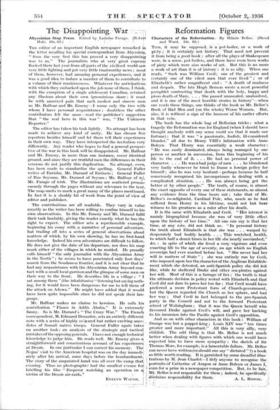Reformation Figures
Tins, it may be supposed, is a pot-boiler, or a work of piety ; it is certainly 'not history. That - need not prevent it from being a good book ; after all the plays of Shakespeare were, in a sense, pot-boilers, and there have even been works of piety which were also works of. art. But this is no more a work of art than it is of history : it is so silly. When one reads, "Such was William Cecil ; one of the greatest and certainly one of the vilest men that ever lived' ; or of
Elizabeth's rather magnificent end : " A death of madness and despair. The late Hugh Benson wrote a most powerful pamphlet contrasting that death with the holy, happy-and pious death of Mary. . . . She passed unanealed, unabsolved, and it is one of the most horrible stories in history"—when one reads these things, one thinks of the book as Mr. Belloc's Book of Bad Men and (on the whole) Worse Women. But, alas, it is without a sign of the humour of his earlier efforts in that vein.
The book has the whole bag of Bellocian tricks : what , a tragedy the Reformation was for England (when I should have thought anybody with any sense could see that it made our fortune) ; that it was " a passionate, foolish, ill-considered blunder," all due to Henry VIII's infatuation with Anne Boleyn. That Henry was essentially a weak character : " He was easily dominated, always being managed by one person or another in succession, from this beginning of his life to the end of it. . . . He had no personal power of character. . . . He was a bad judge of men . . . he blundered very badly whenever he tried to frame a foreign policy for himself ; also he was very hesitant—perhaps because he half consciously recognised his incompetence in dealing with a complicated situation. . . . He was always being got the better of by other people." The truth, of course, is almost the exact opposite of every one of these statements, as almost any evidence from the time bears out ; take that of Mr. Belloc's co-religionist, Cardinal Pole, who, Much as he had suffered from Henry in his lifetime, could not but bear witness to his greatness as a ruler after his death.
It is the same with Elizabeth and Cecil. "Hier interest 'i mainly biographical because she was of very little effect upon the history of her time." All one can say is that her time, at any rate, did not think so. " In personal history the truth about Elizabeth is that she was . . . warped by desperately bad bodily health.. . . This wretched health, to which half a dozen timesin her life she nearly succumbed," &c.: in spite of which she lived a_very_vigorous and even exacting life to the age of seventy, an age which no English sovereign had ever reached before her. " She never had her will in matters of State " ; she was entirely run by Cecil, who imposed upon her the character of the Anglican Establish= ment which she detested, an anti-Spanish policy she did*Ot like, while he sheltered Drake and other sea-pirates against her will. Most' of this is a farrago'of lies; the truth is that the, ultimate decision in policy rested with Elizabeth aad that Cecil did not dare to press her too far ; that-Cecil would have preferred a more Protestant form of Church-government, but the Queen regarded the Church as her sphere, and had her way ; that Cecil in fact belonged to the pro-Spanish party in the Council and not to the forward Protestant school of Walsingham ; that it was the Queen herself whb favoured Drake against Cecil's will, and gave her backing to his incursion into the Pacific against Cecil's opposition.
And so on with other characters in this book : William of Orange was but a puppet-king ; Louis XIV was " ten times greater and more important." All this is very silly, very childish. The odd thing is that Mr. Belloc is not much better when dealing with figures with which one would have , expected him- to' have more sympathy : the sketch of Sir Thomas More, for example, is a lamentable failure. Mr. Belloc can never have written (oshould one say" dictated " ?) a book so little worth reading. . It is garnished by.some dreadful illus- trations by M. jean Charlotdety anyone to recognise the portraits of Catherine of Aragon or Anne Boleyn or James I,. even for a prize in a newspaper competition. But, to be fair,.
Mr. Belloc is not responsible for these ; specifically.;•










































 Previous page
Previous page